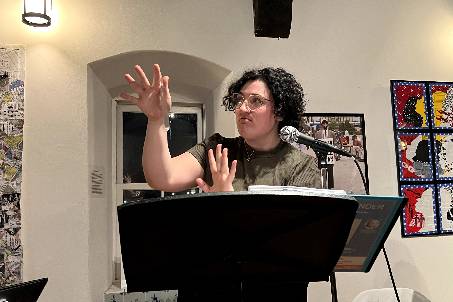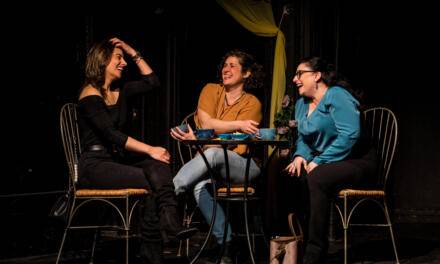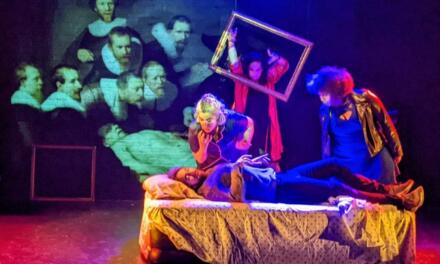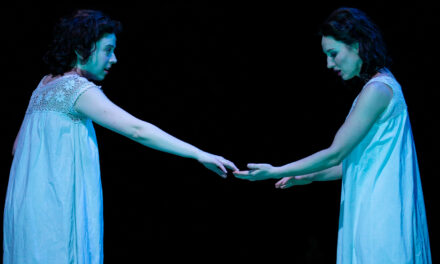Presented by NYC’s Piper Theatre, Aftermath is a new pop musical-in-development written by Daniel McKamey, with lyrics by Pance Pony and book by James Clements. The story follows the aftermath of a school shooting, in which four survivors arrive at group therapy and, while bonding over shared grief, learn of a diary the shooter left behind. Now, they must each choose how to best handle this discovery and move forward toward healing. Inspired by McKamey’s real-life experience, the musical is a searing examination of the impact of what has become an everyday American tragedy.
A staged reading of Aftermath took place on November 10, 2023, at the Old Stone House in Brooklyn, NY. I spoke with McKamey, Pony, and Clements, and director-collaborator Bailey Nassetta, about the piece’s development, message, and plans for future production.
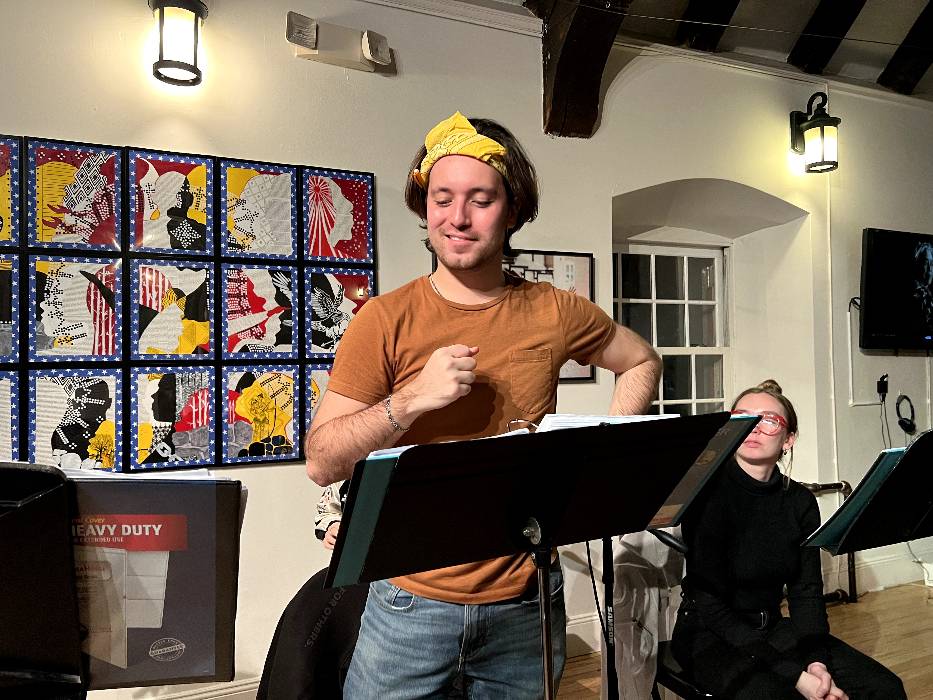
Christopher Cheng in Aftermath. PC: Patrick Dwyer.
 What inspired “Aftermath,” and how did the creative team come together to develop it?
What inspired “Aftermath,” and how did the creative team come together to develop it?
Daniel McKamey: I began writing Aftermath during my freshman year in college, prompted by a traumatic event where someone walked onto our campus and started shooting. Feeling helpless, I felt as though I had to do something about it; I wanted to write a musical but had no prior musical experience. I started teaching myself how to play the piano and how to write songs on YouTube just so I could write this show. The motivation was to explore the theme of overcoming trauma and grief, which I felt was often overlooked. The process of writing the music turned out to be transformative, leading me to unexpected encounters and life-changing experiences. I graduated college and then moved to New York to pursue writing the show, where I met Pance and we became fast friends. James joined the production soon thereafter.
Pance Pony: While Daniel’s inspiration came from real-life experience with gun violence, my inspiration came from my long journey recovering from agoraphobia brought on by a traumatic event. I learned that trauma manifests throughout the body in different ways, and recovery is a bumpy road. Daniel was first a friend before he was a writing partner, and helped me overcome a lot of my fears. Teaming up to write about trauma recovery only felt natural at that point.
Gun violence is a very divisive and loaded topic, especially on which to base a musical. How did you balance the gravity of the subject matter with the process of building an accessible story?
DM: From the beginning, my intention was to focus on the theme of overcoming trauma and grief. I believe this is a universal subject that hasn’t been extensively explored in musicals. After the shooting at my college, I felt a lack of avenues for healing, and I wanted to create something that delves into this aspect. The goal was to always focus on the survivors, which is often overlooked after any tragedy.
James Clements: I think, for our team, it is about making sure we are never preachy. People don’t come to the theatre to be talked down to. It is our job to tell a rounded story about real people who have experienced what should be an unthinkable tragedy, but is in fact a daily occurrence in this country. If we can tell a meaningful story that connects with audiences and engenders empathy, regardless of someone’s politics, and doesn’t sensationalize or glamorize gun violence, then we have achieved our desired aim as makers. The reality is this is something we are faced with constantly – living with it as a society is much more difficult than creating a show about it.
What were some of your musical inspirations for the piece? How does the music support the show’s thematic and narrative journey?
DM: The unconventional nature of Aftermath led me to approach the music in a way that aligns with the storytelling, pushing the boundaries of what is typically heard in theater. I aim to create a sound that appeals to individuals who don’t typically engage with musicals, thereby broadening the audience for this art form. I think my main influence was Rent, first and foremost; it was the musical that got me into the genre as a whole. The goal was to shift the traditional sound of theater, drawing inspiration from a variety of genres like pop, hip-hop, and minimalism including influences from artists such as Kendrick Lamar, Chance The Rapper and Max Richter.
PP: Daniel has a unique sonic language, so my job as the co-lyricist is to trust and stay true to his vision while providing characters with more depth.
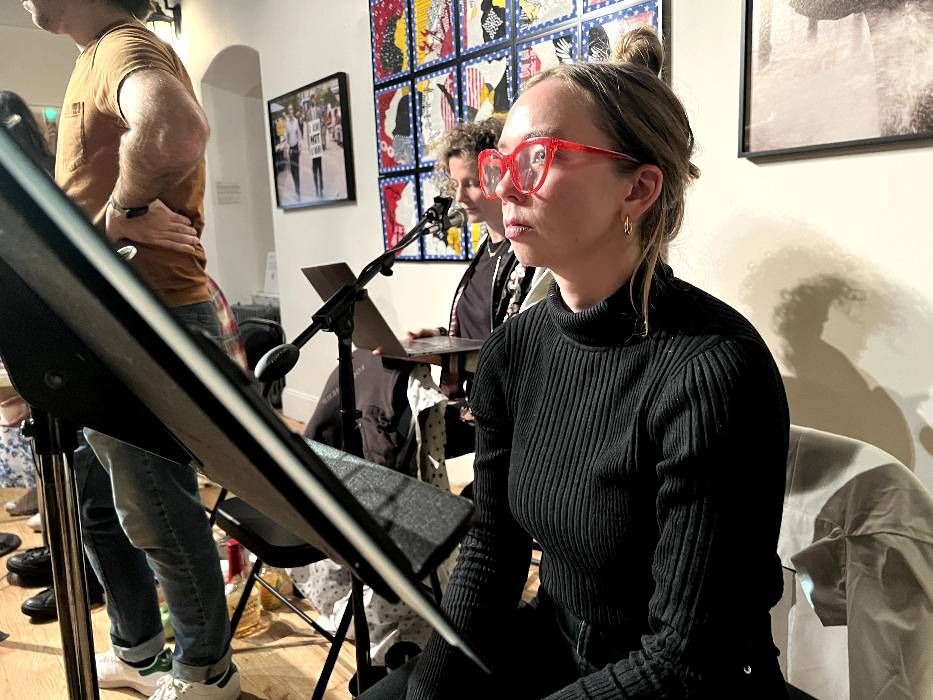
Briana Archer in Aftermath. PC: Patrick Dwyer.
The show centers around the human stories behind a school shooting, and on each character’s path toward healing. Were there any specific stories or people that inspired these characters, and how did you and the team build or rework their tales for the stage?
DM: Many of the characters are based on myself and individuals I knew from college who experienced the aftermath of the shooting. For example, one of my best friends, who wasn’t in the library during the incident, struggled with agoraphobia afterward. The experiences of those around me influenced the characters in the musical, allowing us to build authentic and relatable stories for the stage.
JC: Daniel’s own lived experience is, of course, the soul of the soul of the show. Where I feel like I came into it was through my work with Manuel Oliver, an immigrant artist whose son was murdered in the Parkland mass shooting. We worked together over a year in 2019 and made a piece of verbatim theatre that is still touring the US today, where he describes the loss of his child, the difficult years that have followed, and what is quite frankly a state of emergency in relation to gun violence in America. When we were working on the piece, I went to stay with the Olivers in Parkland, and got to see their son Joaquin’s room, meet his friends, and hang out with his community. He was clearly such a joyful, kind young man, and so I helped Manuel craft a piece that recalled all of that as well – Family Guy, video games, hot dogs, pranks. People are not statistics; nor should we require folks to be “perfect” victims. So I hope we are presenting our characters as rounded, complex and flawed. They had a life before the shooting, and they will have to find a way to have one after.
Although “Aftermath” largely avoids the political elements of mass shootings, each character has very clear and strong opinions about the events that transpired and beliefs on how best to move forward. Was it difficult to separate political or personal convictions from the storytelling process?
Bailey Nassetta: In my opinion, it doesn’t seem realistic to separate the political or the personal from the storytelling process. I think they all inform each other and are connected. That being said, as a director, my focus was less on compartmentalizing these facets and more on observing how each of them intersect with one another. A question I kept revisiting was: What does each character do to survive?
PP: My opinions did not get in the way of the storytelling. No matter how strong our convictions are, art is not the place to preach. We avoided the topic in this version of the reading; in future renditions, we are looking to add a bit of the debate back into the story for realism, but we will let the audience decide for themselves.
DM: I wanted to provide a narrative that actively explores the process of overcoming trauma, as I felt there was a lack of such content after the shooting at my college. While the news was addressing the political aspects, I struggled to find a focal point for healing. I felt like no one really cared about the victims. No one cared that now I had to figure out a way to put my life back together, my friends were having panic attacks every time they went outside, no one could focus on school, and no one cared about us. All the talk was about the shooter: who he was, why did he do this, etc.
Reflecting on my experience, I recognized the need to create a show that delves into the process of healing and overcoming adversity. Even in the initial draft, the focus was on crafting a narrative about the intricate journey of healing. This show serves as a beacon for those grappling with similar challenges, offering a resource to turn to for inspiration and guidance during their own journeys.
Mental health, including that of the shooter, is a strong component of “Aftermath.” Do you feel that this is something that’s discussed enough or handled properly in our public dialogue around gun violence? What, in your opinion, are the best ways we can individually and collectively help survivors? (And are there any resources you’d like to share?)
BN: I believe we can do a better job discussing mental health as it pertains to folks who are impacted by shootings. It’s important that we listen to survivors and follow their lead on how we can be supportive. In addition to this, there are a lot of amazing artists making transformative work on this topic. One artist in particular I’d like to shout out is Ileana Doble Hernandez, who makes experimental installations that provoke audiences to think about systems of inequality and the effect of gun violence on children. Two of her installations were displayed at The Old Stone House during the night of our reading, one of which asked audience members to fill out postcards to their elected officials, advocating for gun control. These postcards were then mailed out the following week.
What’s next for this piece, and what do you hope audiences will take away from it? Are there any partnerships you’d like to see?
BN: I’m excited to continue developing and workshopping this piece over the next year. We got a lot of really great feedback from our reading and I’m looking forward to seeing how we apply it moving forward. I think it would be really cool to partner with a theater company that specializes in new musical development, and to have some deep, sustained support and mentorship as we go into our next round of development.
JC: I think the reading that Piper Theatre produced, supported by funding from IndieSpace, gave us lots of brilliant feedback to work through. Daniel and Pance have plans for new music and lyrics, and I have lots of ideas of where we can go next with the story. On my project with Manuel, we partnered with Moms Demand Action, March for Our Lives and his non-profit, Change the Ref, and those were super fruitful relationships, because one of the superpowers of live theatre is how it galvanizes people. We would literally have information tables in the lobbies of theatres, voter registration booths, you name it – people would come straight out the theatre saying, “What can I do?” And we could respond – all of this! So I would hope for similar relationships for this project.
DM: Ars Nova is always a place I envisioned this show because I believe we align on so many core values. I envision a workshop for Aftermath to refine and tweak aspects of the musical. One of the best comments I received after the show was “I feel like at one point I stopped watching a play and was actually watching the aftermath of a school shooting;” it really touched my heart because that was the goal all along. And it made me realize that we are on to something truly groundbreaking that will change so many lives. I want the audience to walk out thinking “Wow, that music was amazing and wow, that story really touched me.” If I can do one of those things, everything I’ve been through was worth it.
This post was written by the author in their personal capacity.The opinions expressed in this article are the author’s own and do not reflect the view of The Theatre Times, their staff or collaborators.
This post was written by Emily Cordes.
The views expressed here belong to the author and do not necessarily reflect our views and opinions.

